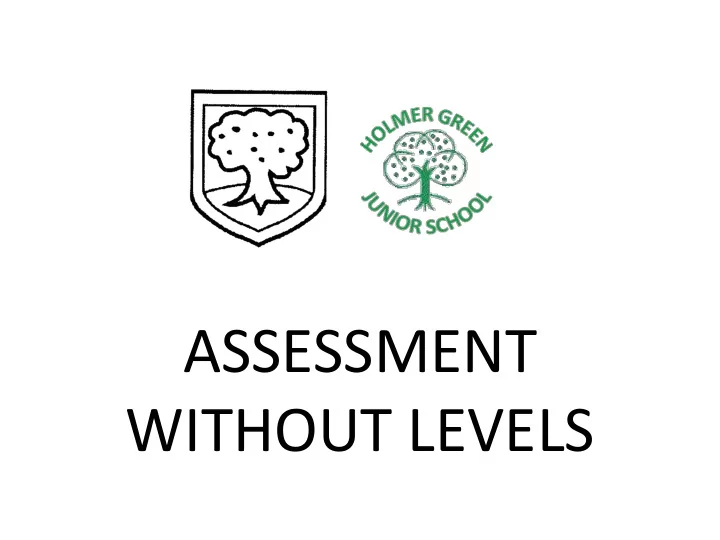

ASSESSMENT WITHOUT LEVELS
AIMS • To inform parents of changes to the new National Curriculum • To explain the changes to the assessment system • To share the language that will be used to describe attainment • To develop an understanding of how pupils working below or at greater depth will be challenged • To provide an opportunity for parents to consider how the schools use assessment on a day to day basis
NEW NATIONAL CURRICULUM • New National Curriculum was in place for most in September 2014 and fully introduced by September 2015 • Described as ‘rigorous, engaging and tough’, there are significant changes to the content of subjects. • The aim of the new curriculum is ‘to provide the essential knowledge they need to be educated citizens.’ • The programmes of study set out the content for those subjects that should be taught to all pupils.
NEW NATIONAL CURRICULUM Core Subjects Foundation Subjects English Art and Design Maths Computing Science Design and Technology Geography History Music Physical Education Languages (KS2 only) All maintained schools are also required to teach Religious Education. PSHE is not statutory; however, both schools teach this subject.
NEW CURRICULUM, NEW EXPECTATIONS • All subjects have changes to their programmes of study. The major changes in the foundation subjects include – Greater emphasis on hard facts and knowledge in subjects such as Science and Geography – A more chronological approach in History – A new computing curriculum with a focus on programming and e-safety mentioned at every key stage – A broader focus on promoting healthy living within the Physical Education curriculum – Studying a foreign language becomes compulsory at KS2, as does cookery within the Design and Technology curriculum
NEW CURRICULUM, GREATER EXPECTATIONS • Changes in English and Maths in particular emphasise the requirement to learn more at a younger age English Maths Year-by-year objectives for Y1 and Yearly objectives Y2, then LKS2 and UKS2 Focus on reading for pleasure Larger numbers earlier Reciting poetry Tables to 12x12 by end of Y4 Priority for phonics in both key Earlier introduction of formal stages written methods Required spelling & grammar Earlier introduction of standard objectives & wordlists e.g. use of units of measurement the possessive apostrophe at Y2 Focus on fractions e.g. finding ¼ and using the correct homophones and ½ from Y1 at upper KS2 e.g. practice/ practise Roman numerals
ASSESSMENT PRINCIPLES • The new curriculum resulted in changes to the assessment system. • There were three key principles identified in effective assessment systems. These were to – Give reliable information to parents about how their child, and their child’s school, is performing – Help drive improvement for pupils and teachers – Make sure the school is keeping up with external best practice and innovation
OLD ASSESSMENT SYSTEM Old system: Levels 1c 1b 1a 2c 2b 2a 3c 3b 3a 4c 4b 4a 5c 5b 5a 6c Y1 Y2 Y3 Y4 Y5 Y6 Pupils’ attainment was measured in a linear way. They moved through the levels and showed progress by achieving set markers.
NEW ASSESSMENT SYSTEM • New system: Assessment without Levels • Schools were given the freedom to make their own choices about how to assess based on the assessment principles and the new curriculum • It is important to note that the new systems cannot be compared with the old • The linear system has been replaced with a set of steps within each year group. • Pupils will start each year with a new set of objectives to work their way through.
NEW ASSESSMENT SYSTEM • New system: Assessment without Levels • Objectives are set out for each year group. • All children are expected to be working on their year group objectives YEAR GROUP EXPECTATIONS Working below year group expectations Working towards year group expectations Working at year group expectations Working at greater depth
OBJECTIVE EXAMPLES Y2 WRITING
OBJECTIVE EXAMPLES Y4 MATHS
OBJECTIVE EXAMPLES Y6 READING
NEW ASSESSMENT SYSTEM • Staff identify where pupils have achieved objectives • When the vast majority of objectives have been achieved, pupils will be deemed to be working at age related expectations • Pupils will not move onto the next year group’s objectives but will study their curriculum in greater depth • Pupils who are working below age related expectations will be supported to ensure that their needs are being met.
Recommend
More recommend